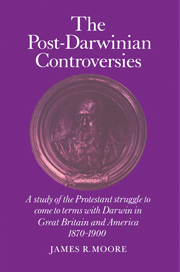 The Post-Darwinian Controversies
The Post-Darwinian Controversies Book contents
- Frontmatter
- Contents
- Dedication
- Preface
- PREFACE TO THE PAPERBACK IMPRESSION
- Introduction: the terrain of revision
- PART I HISTORIANS AND HISTORIOGRAPHY
- PART II DARWINISM AND EVOLUTIONARY THOUGHT
- PART III THEOLOGY AND EVOLUTION
- Conclusion: on coming to terms with Darwin
- Dedication
- Notes to the text
- Bibliography
- Index
Introduction: the terrain of revision
Published online by Cambridge University Press: 22 January 2010
- Frontmatter
- Contents
- Dedication
- Preface
- PREFACE TO THE PAPERBACK IMPRESSION
- Introduction: the terrain of revision
- PART I HISTORIANS AND HISTORIOGRAPHY
- PART II DARWINISM AND EVOLUTIONARY THOUGHT
- PART III THEOLOGY AND EVOLUTION
- Conclusion: on coming to terms with Darwin
- Dedication
- Notes to the text
- Bibliography
- Index
Summary
[Darwin's ‘Origin of Species’] was badly received by the generation to which it was addressed. … But the present generation will probably behave just as badly if another Darwin should arise, and inflict upon them that which the generality of mankind most hate – the necessity of revising their convictions. Let them, then, be charitable to us ancients. … Let them as speedily perform a strategic right-about-face, and follow the truth wherever it leads It may be, that, as history repeats itself, their happy ingenuity will…discover that the new wine is exactly of the same vintage as the old, and that (rightly viewed) the old bottles prove to have been expressly made for holding it.
T. H. HuxleyIt is an agreeable irony that T. H. Huxley, the incubus of late- Victorian theology, concluded his pioneering essay, ‘On the reception of the “Origin of Species”’, with an allusion to the biblical metaphor of wine and wineskins. It is at once more ironic and less agreeable that in this context he obliquely credited the ‘happy ingenuity’ of his generation for discovering that the new Darwinian wine was of the same vintage as older causo-mechanical explanations of natural phenomena, and thus that older theological bottles, ‘rightly viewed’, had been made expressly to contain it. Less agreeable, this latter irony, because it violates most of the preconceptions which, until quite recently, have been fostered by accounts of Christian responses to Darwin in the later nineteenth century.
- Type
- Chapter
- Information
- The Post-Darwinian ControversiesA Study of the Protestant Struggle to Come to Terms with Darwin in Great Britain and America, 1870-1900, pp. 1 - 16Publisher: Cambridge University PressPrint publication year: 1979


